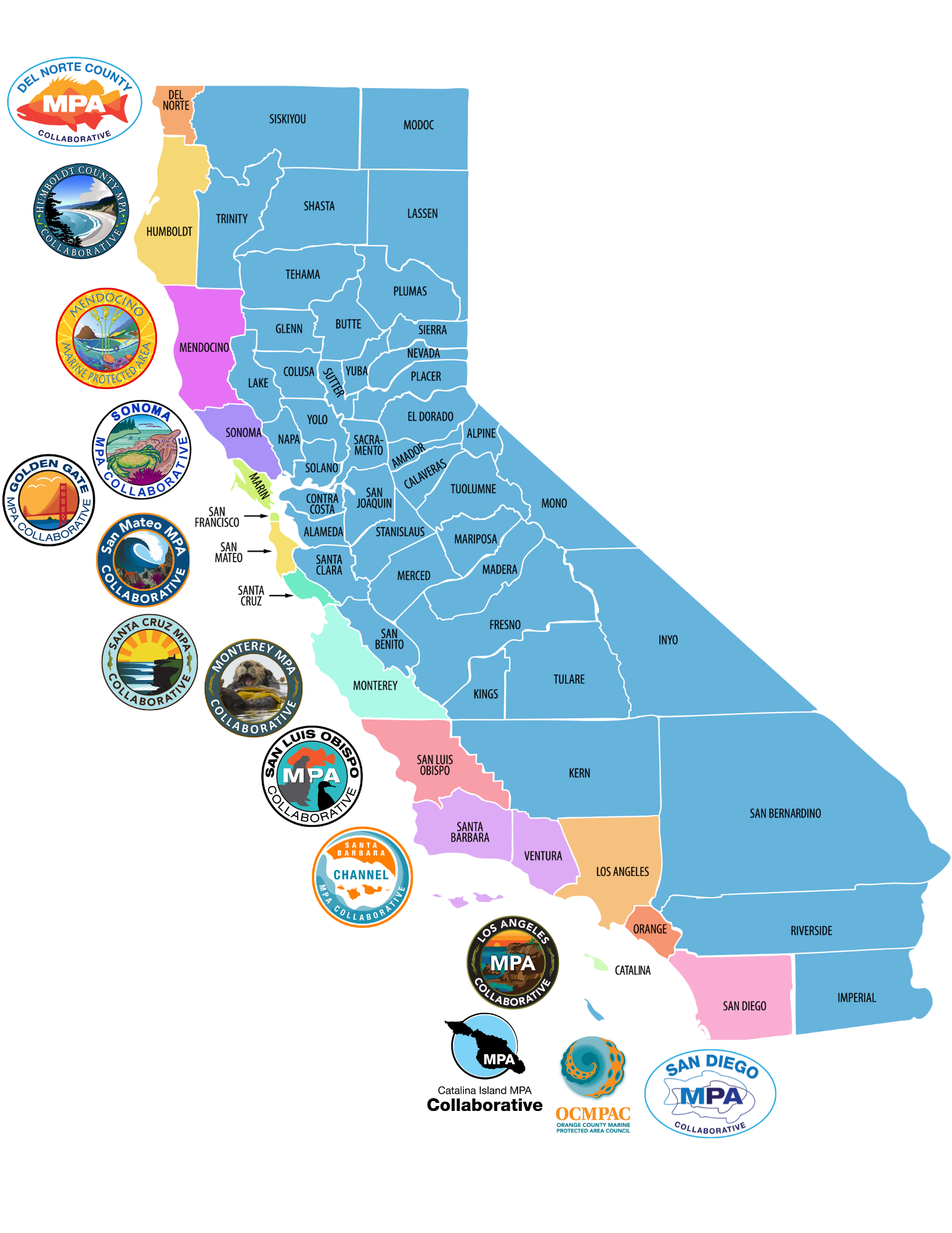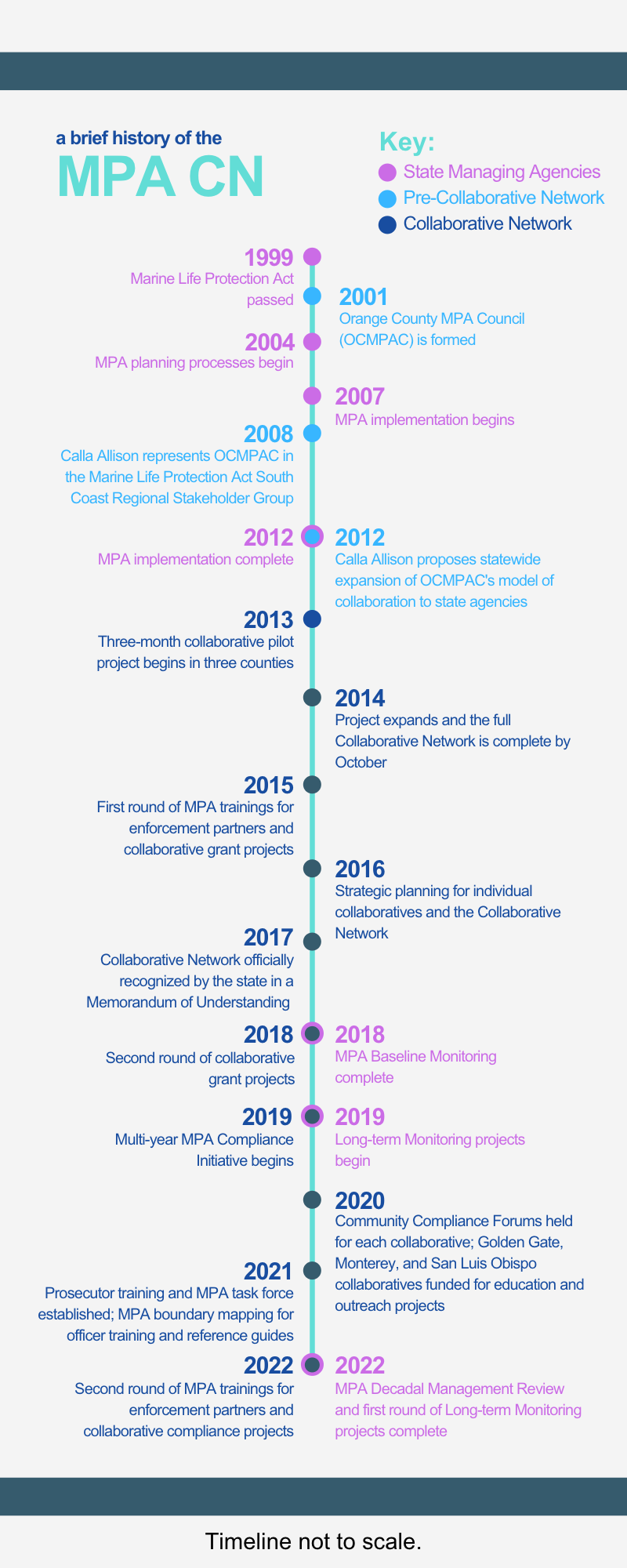Our Vision
The vision of the MPA Collaborative Network is to ensure the health and sustainability of our natural and social environments through civic engagement in local marine management and stewardship.
Our Purpose
The purpose of the MPA Collaborative Network is to ensure and support a cooperative and just structure that encourages participation in decision-making processes, grounded in the values of respect for differences and the interconnection between humans and nature.
The MPA Collaborative Network commits to providing pathways for active participation in marine management and stewardship from people of all identities including but not limited to gender, sexual orientation, race, ethnicity, national origin, ability, socioeconomic status, marital status, age, education level, culture, religion, and background. This includes actively acknowledging past and present injustice, including ongoing oppression. We recognize that there are barriers to engaging based on these identities. We commit to providing a structure where these diverse ideas and perspectives are heard and valued. We believe that building relationships based on mutual respect will allow us to collectively listen, make decisions, and act together to affect positive change. We acknowledge that societal and ecological health cannot be achieved without the inclusion and leadership of diverse peoples and voices.
Our goal is to embed, build, ensure, and track equity throughout the MPA Collaborative Network and encourage partners to do the same. We aim to do so by supporting the engagement, leadership, initiatives, and self-determination of marginalized peoples. We acknowledge that this work is an ongoing process and commit to continual evolution.
Seven Core Values will guide the decisions and actions of the members of the CN moving forward:
1. Facilitating the sharing of diverse ideas and perspectives
2. Encouraging active participation from people of all identities including but not limited to gender, sexual orientation, race, ethnicity, national origin, ability, socioeconomic status, marital status, age, education level, culture, religion, colonial foundation, and background.
3. Advancing an anti-racist and decolonizing ethic that supports individual and collective agency, tribal sovereignty, self-determination, traditional environmental management practices, and the dismantling of barriers
4. Listening, making decisions, and acting together
5. Developing mutual respect
6. Building relationships
7. Affecting positive change
- We cannot separate ourselves from our core values; all change must occur within the context of our core values
- We belong to multiple diverse communities, cohorts, Nations, and ecosystems all of which are interconnected and make us who we are
- There is no such thing as true objectivity/neutrality – we are products of our environment and experiences
- We can achieve more working together
- There are more ways we are similar than there are ways we are different
- Shifting baselines affect our perceptions
- We are part of our natural environment
- Balance is needed, socially and ecologically, to ensure sustainability
- We can learn from each other’s unique historical perspectives and experiences, especially from Indigenous peoples who built societies that were sustainable for thousands of years
- A healthy ocean is vital to life on Earth
These elements of our Strategic Plan were reviewed and updated to better reflect our organization as of January 2023.
Why the Collaborative Network?
California implemented a world-class system of 124 marine protected areas in 2012, created through a comprehensive stakeholder-led public process.
Collaborative Network Director Calla Allison saw a challenge moving forward: to ensure locals had a voice in the management of their MPAs.
Allison had served as a stakeholder creating South Coast MPAs, representing the Orange County Marine Protected Area Council – the first group organized to bring together area experts to collaboratively manage local MPAs. Seeing first hand the success of this model, Allison proposed replicating it on a county by county basis.
She began approaching local stakeholders to organize collaboratives in San Mateo, San Diego, and Santa Barbara in 2012, supported by the Natural Resources Agency and Department of Fish and Wildlife, and funded by Resources Legacy Fund.
Local stakeholders and MPA experts quickly planned meetings to identify existing resources and propose projects to increase local awareness of MPAs.
Based on the success of these groups, in 2013 Allison led the development of Collaboratives covering each of California’s coastal counties.
Fourteen collaboratives are now active along the coast, carrying out projects that answer local needs regarding MPAs.
What sets this model apart is the bottom-up, localized, and participatory approach to resource management. Rather than the state providing a structure for engagement, collaborative members develop it themselves. This leads to more buy-in and resource sharing from local organizations and allows state agencies to respond for requests for structure and input, rather than feeding it from the top-down.
Offering local partners an active voice in MPA management.
The goal of the MPA Collaborative Network is to engage experts in local MPA stewardship and management. We provide the information, structure, support, and inter-agency communication necessary to facilitate the creation of collaborative groups that are uniquely suited to local needs.
Collaboratives provide a forum for nonprofits, fishermen, tribal representatives, government staff, municipalities, academic institutions, scientists, teachers, and aquaria to work together to enhance understanding and compliance of MPAs.
Collaborative Network staff work to make it easier for local experts to partner with the state, strengthening connections and facilitating the flow of information between these local MPA professionals and managing agencies, and working closely with California’s Department of Fish and Wildlife, State Parks, Ocean Protection Council and Ocean Science Trust.
Collaboratives are a key part of the Ocean Protection Council’s guiding principles for governing California’s MPA network, allowing the state to engage in meaningful partnerships at the local level, leverage resources, and ensure transparency.
The MPA Collaborative Network is fiscally sponsored by Resources Legacy Fund, a nonprofit 501(c)(3) organization.
Learn More

MPA Compliance Initiative Impact Report 2019-2022

MPA Collaborative Network: Fostering Local Stewardship in Marine Resource Management – MPA Decadal Management Review Key Partner Report

MPA Collaborative Network Brochure

Collaborative Network Impact Report 2014-2021

Climate Resilience and California’s MPA Network Overview

2018 Small Grants Program – Summary Document
Thank You to Our Funders!
The MPA Collaborative Network is a fiscally sponsored by Resources Legacy Fund, a nonprofit 501(c)(3) organization.







